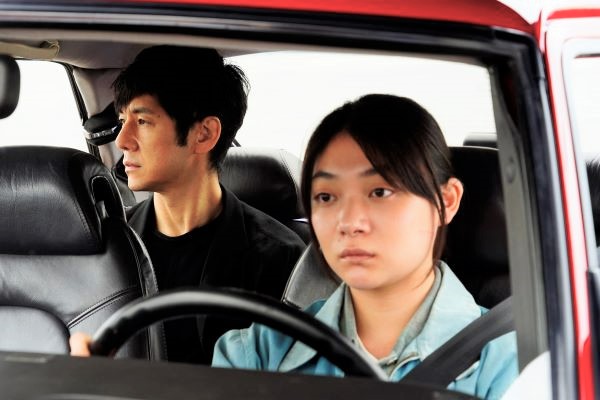![]() Haruki Murakami’s short story “Drive My Car,” which opens his 2014 collection Men Without Women, is a typically spare and evocative work, one which packs its protagonist’s lifetime of pain, secrets, and regrets into elegantly crafted, terse prose. An actor named Kafuku hires a woman named Misaki as his personal driver while he performs in a theater production of Chekhov’s Uncle Vanya. As they get to know each other, Kafuku tells Misaki a personal story concerning his recently deceased (unnamed) wife and her extramarital affairs, which he never confronted her about, and, most pertinently, how he befriended one of his wife’s lovers without revealing his knowledge of the affair. The story is left hauntingly open-ended, Kafuku resigning himself to the fact that despite his close intimacy to his late wife, there were many facets to her that were permanently inaccessible to him.
Haruki Murakami’s short story “Drive My Car,” which opens his 2014 collection Men Without Women, is a typically spare and evocative work, one which packs its protagonist’s lifetime of pain, secrets, and regrets into elegantly crafted, terse prose. An actor named Kafuku hires a woman named Misaki as his personal driver while he performs in a theater production of Chekhov’s Uncle Vanya. As they get to know each other, Kafuku tells Misaki a personal story concerning his recently deceased (unnamed) wife and her extramarital affairs, which he never confronted her about, and, most pertinently, how he befriended one of his wife’s lovers without revealing his knowledge of the affair. The story is left hauntingly open-ended, Kafuku resigning himself to the fact that despite his close intimacy to his late wife, there were many facets to her that were permanently inaccessible to him.
Murakami’s story is just 30 pages, but Ryusuke Hamaguchi has masterfully and thrillingly expanded it into his three-hour feature Drive My Car, which mines material from the original short story as well as a couple of other stories from Men Without Women, to deliver a profound study of the connections between art and life, fully fleshing out insights into the mysterious motivations of the human heart that are only teasingly hinted at in Murakami’s story.
The 40-minute prologue introduces us to a married Tokyo couple, actor and theater director Yusuke (Hidetoshi Nishijima) and screenwriter Oto (Reika Kirishima), who practice an unusual form of artistic collaboration. While they have sex, Oto brainstorms ideas for stories, which Yusuke recites back to her afterward. (This situation borrows its premise from Murakami’s short story “Scheherazade.”) They’re a loving, contented, sexually passionate partnership, or so Yusuke thinks, until the day he arrives home and witnesses Oto having sex with another man. Yusuke surreptitiously leaves the house without confronting them, planning to bring up the matter with Oto at a later time. However, sudden tragedy prevents this conversation from happening, or further talks of any sort: Oto has a massive cerebral hemorrhage that kills her instantly.
After the opening credits, the film cuts to two years later, with Yusuke directing a production of Uncle Vanya, the play he was acting in when his wife died, in Hiroshima. Yusuke was playing the title role then, but he declines to reprise that part for this new production. He’s still suffering from grief and the lack of closure concerning Oto’s affair. Consequently, performing as Uncle Vanya would be too painful.
The version of Uncle Vanya that Yusuke directs is boldly experimental. The cast is made up of Japanese actors along with those from other Asian countries, all of whom will speak to each other in their native languages, including a deaf actress communicating in Korean sign language. The concept behind the production is that even though the actors won’t understand each other’s dialogue, they’ll be able to communicate with one another in ways that transcend words.
One cast member Yusuke selects serves a personal agenda known only to him: a young actor named Takatsuki (Masaki Okada), who just happens to be the man he saw with his wife. Perhaps as an act of revenge, Yusuke casts him as Uncle Vanya, a role Takatsuki would seem to be too young to play, and which is most likely beyond his abilities.
Yusuke’s titular car is a bright red Saab 9000, which is practically another character, since many shots are devoted to observing this car traverse through various landscapes. Yusuke likes to take long drives alone, during which he runs lines from Uncle Vanya while listening to a tape of the dialogue recorded by his late wife. He expects to continue to do this while he directs the play. However, for insurance liability reasons, the theater company insists that he use a driver they’ve hired for him: Misaki (Toko Miura), the young woman who will drive him between his home and rehearsal. Although the narrative takes many detours, the main story line is the evolving relationship between the still-grieving Yusuke and the taciturn, soft-spoken Misaki, and how they connect with each other through their traumatic pasts.
Perhaps the most valuable aspect of Drive My Car is Hamaguchi’s privileging of women’s voices and experiences, which contrasts significantly with Murakami’s story. As great a writer as Murakami is, he’s been justly criticized for creating female characters who are considerably less multidimensional than the men. As mentioned before, the wife in Murakami’s original story is nameless, and the woman driver exists mostly as a soundboard to allow the male protagonist to tell his story. Hamaguchi corrects this narrative defect in a moving and wonderfully absorbing fashion, making compelling portraits of the women who were light sketches in Murakami’s story. As such, Drive My Car solidly confirms Hamaguchi’s status as one of the most accomplished writer-directors currently working.

















Leave A Comment